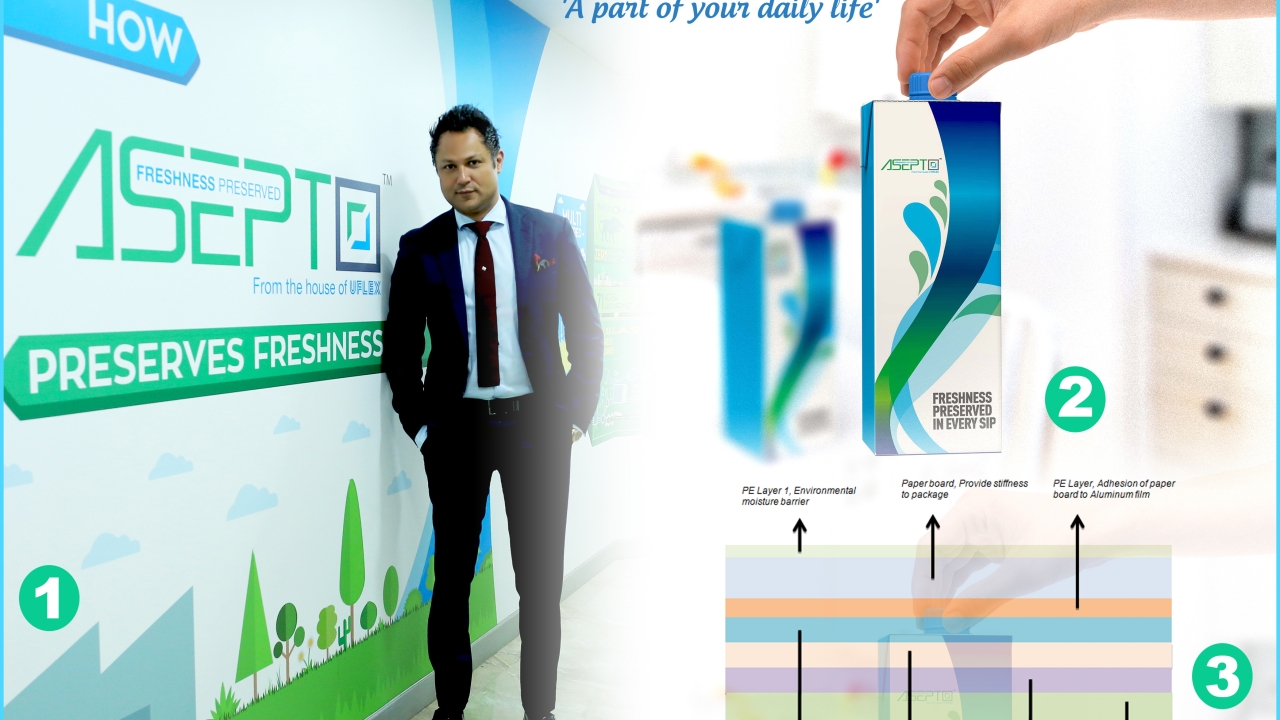Uflex launches aseptic liquid packaging plant in Gujarat
Uflex has unveiled Asepto, its aseptic liquid packaging brand, with the manufacturing plant in Sanand, Gujarat to be commercially operational by April this year.

The investment towards the Aseptic Packaging plant is INR 580 crore (approximately 85 million USD) and once operational, it will employ around 250 people.
Commenting on the investment that has gone into the upcoming aseptic packaging manufacturing plant, R K Jain, group president, corporate food and beverage, at Uflex, said: ‘Our total investment over the next two to three years is INR 1500 crore in a phased manner. This already includes 85 million USD towards setting up the aseptic packaging manufacturing plant. The balance will be utilized for modernization of manufacturing systems and processes, and research and development towards yet better flexible packaging solutions using the most contemporary technology. From the current top line of one billion USD, we are positive of doubling up in the next three to four years.
‘The aseptic packaging manufacturing plant covers 21 acres of the 72 acre land parcel that Uflex has bought at Sanand, Gujarat. Remaining land may cater to any future expansion of Uflex’s existing business as well as for aseptic packaging manufacturing as the need be. Upholding our commitment towards environmental sustainability, the aseptic packaging manufacturing facility has been designed to be a zero discharge plant. Solar panels and passive architecture-envelop insulation have been used to preserve natural light besides conserving power energy.’
Ashwani Sharma, president and CEO of new business initiatives at Uflex, said: ‘The aseptic packaging market in India is majorly classified into three segments, namely juices, dairy products and liquor. Packaging of flavored milk, other dairy items and liquor in aseptic packaging material will play a key role in propelling the growth of aseptic packaging in the coming years both in India and overseas. Our total manufacturing capacity of seven billion packs per annum will cater to 90 percent of the domestic market demand. In the Asia-Pacific region, the market growth is around seven percent and in India the growth has been in double digits for the last three to four years.
‘Presently the Indian aseptic liquid packaging market is growing at 17 to 18 percent a year and the market is expected to double up in the next five years to approximately 20 billion packs a year. Drawing parallels, China boasts of a tremendous growth story which has already reached approximately 80 billion packs. In India with similar population the growth potential is humungous. We are all set to take off in the Indian market and position this business globally,’ commented Sharma.
Aseptic packaging is made by laminating polyethylene with paperboard and aluminum foil. This multi-layered construction enables packs to protect the contents from various factors responsible for spoilage, thereby preserving the product freshness and value. The aluminum foil layer is a strong barrier for oxygen and light; the innermost layer made of polyethylene makes it possible to seal through the pack; and the paper layer provides stiffness, making it possible for the cartons to assume a brick shape. Printing, creasing and punching of paper board is done on the printing machine. This is followed by the lamination of paper board on the extrusion machine with aluminum film and a different type of polyethylene. The rolls from the lamination machine are converted to rolls of smaller width as per the required size of packages. Finished rolls are sent to the customer and run on the forming and filling line.
Aseptic packaging further reduces dependency on the cold chain to increase the shelf life of the product.
Ashok Chaturvedi, Uflex chairman and managing director, added: ‘We will also offer the specialised filling machines to our clients. Our engineering business in Noida is designing and manufacturing machines with a filling speed of 7,500 packs per hour for a typical 200ml pack. We already have a wide customer base to whom we offer fully integrated flexible packaging machines for their solid, semi-solid, granular, powder, paste, gel and viscous fluid products. Now with our aseptic packaging manufacturing plant going operational, getting orders from the existing clients for their liquid products will be a natural extension of our long standing business relationship of several decades.’
Stay up to date
Subscribe to the free Label News newsletter and receive the latest content every week. We'll never share your email address.

